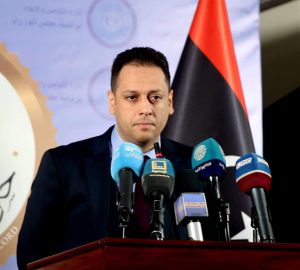By Sami Zaptia.

London, 22 February 2019:
Mohamed El-Sallak, official Spokesperson for Faiez Serraj, head of Libya’s internationally-recognized Presidency Council and Government of National Accord, stressed the keenness of Serraj to prevent the spilling of Libyan blood in the country’s southern region and not to have any clash or confrontations between the brothers of the one nation, whatever the controversy.
“The security and stability of the citizens of the south is higher than any political tension,” he said at a press conference Thursday held at the Media Center of the Prime Minister’s office in Tripoli.
El-Sallak also conveyed the emphasis placed by Serraj on the need to remove civilian installations from any military operations and not endanger the lives of civilians.
The reference here is to the fighting by the Khalifa-Hafter-led Libyan National Army (LNA) in the south of Libya. Hafter has claimed he is imposing security and fighting criminals and Chadian mercenaries in the south.
But his military campaign in the south has also moved on to imposing security on the oilfields. This includes “liberating” the Sharara oilfield which was shut down from armed local protesters.
On the otherhand, continuing his ambivalent stance and mixed signals on Khalifa Hafter, the (LNA) and their role, Serraj nevertheless reaffirmed that he shared what he referred to as the “common objectives, foremost among which is the fight against terrorism, extremism, organized crime and mercenaries from outside the borders”, calling for a common stand in the face of these dangers.
This is a clear signal that he supports Hafter’s military efforts in some regards, a coded message that will not go down well with the enemies of Hafter and most of Tripoli’s main militias.
The National ID Number database crisis
With regards to the National ID Number system and its database being allegedly compromised, he explained that Serraj had instructed the Civil Affairs Authority to take the necessary measures to deal with any technical matters and to ensure the integrity of the system and the database, which was of importance and impact on security.
The alleged compromise of the National ID Number database has been used by the Central Bank of Libya Governor as his reason for withholding the distribution of the hard currency allowance.
The head of the Civil Affairs Authority, onbthe other hand, has said in Libyan media that the number of fake ID numbers is not as great as has been suggested. But he as agreed that any kind of elections should be delayed until the matter is looked into.
Either way, the news has caused great alarm in Libya with fears that any future elections can be swayed by manipulation of the National ID Number.
Munich conference
With regard to the diplomatic meetings held by the President of the Council on the sidelines of last week’s Munich Security conference, Serraj expressed his satisfaction with the conclusions of the meetings held with various international political and military officials, which touched upon the most important files and their ways of supporting the Government of National Accord to fulfill its aims and the need to harmonize the international stance on Libya and make a real contribution to moving the political process forward.
The reference by Serraj for the need for the “unification of the international stance” on Libya is a not-so-veiled call for countries such as France, Egypt, UAE, Italy, Turkey and Qatar etc to all exclusively get behind the intenationally-recognized PC/GNA.
France, Egypt, UAE and Saudi Arabia are in reality considered to be allies of Khalifa Hafter.
On the other hand, Turkey and Qatar are considered to support the Libyan “Islamist” political stream.
Italy and France are in open conflict in pursuing their narrow national interests in Libya which conflict – rather than pursuing a unified EU stance.







